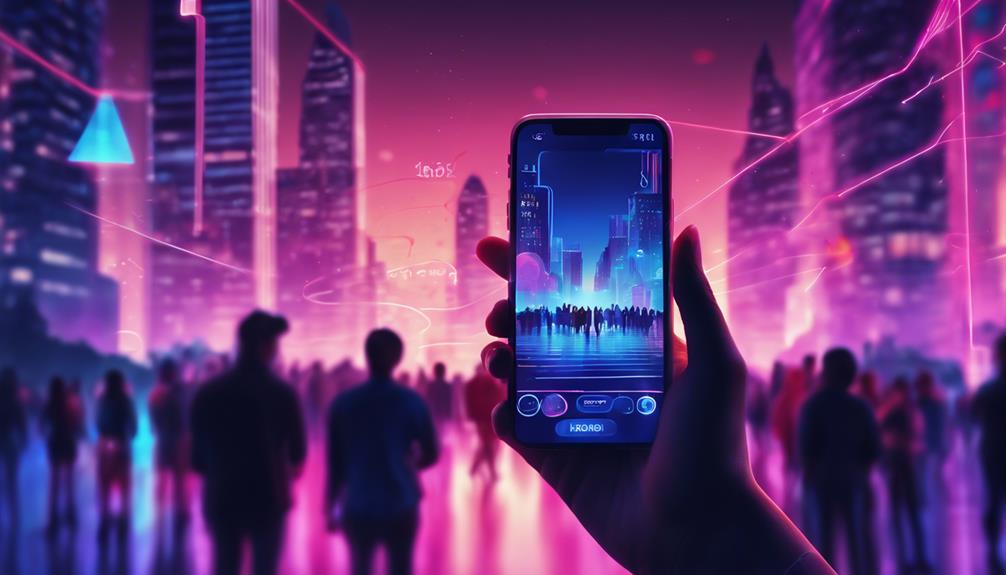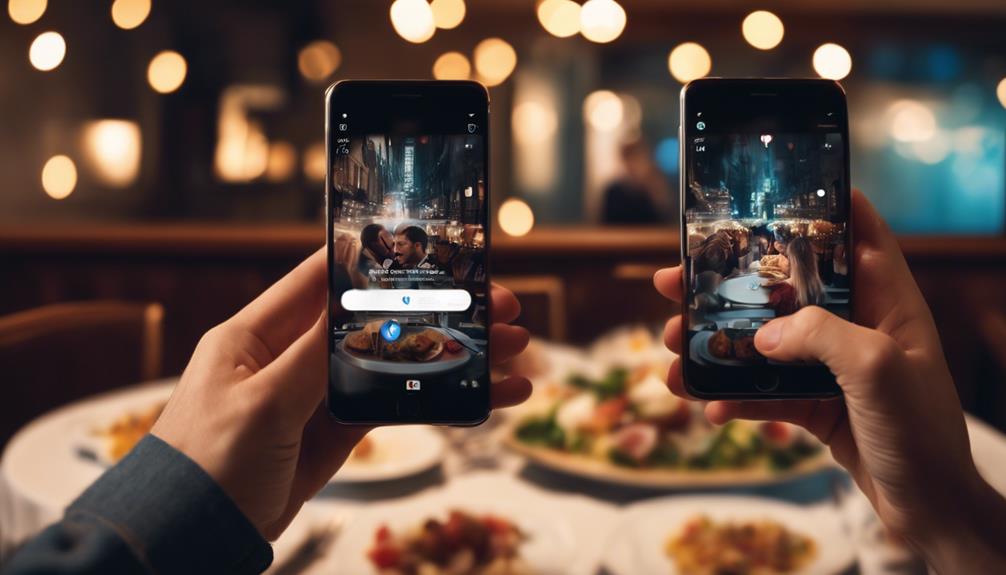Social media has revolutionized the dating landscape, offering ease of digital connections, bridging geographical gaps, and reducing anxiety in face-to-face interactions. However, it also creates unrealistic expectations, masks differences, and increases the risk of encountering deceptive individuals. The blurred lines between public and private life, illusions of online personalities, and challenges in deciphering cues in a digital age further complicate modern relationships. As a result, understanding the complexities of digital relationships is essential. By exploring these nuances, individuals can better navigate the world of online dating and uncover the intricacies of modern love in the digital age.
Key Takeaways
• Social media simplifies initiating contact, bridging geographical gaps, and reducing anxiety in face-to-face interactions.
• Relying on curated profiles and virtual interactions can create unrealistic expectations and mask differences in partners.
• The blurring of public and private boundaries on social media challenges relationship status changes and privacy maintenance.
• The illusion of online personalities can lead to misunderstandings and disappointments in relationships due to disparity between online and offline personas.
• Clear and open communication is crucial in digital relationships to accurately decipher interest and avoid misinterpretation of online interactions.
The Ease of Digital Connections
Social media has unquestionably simplified the process of initiating contact, allowing individuals to connect with potential partners with unprecedented ease and convenience. This ease of connection has bridged geographical gaps and overcome time constraints, making it possible for people to connect with others across the globe.
Additionally, social media platforms have reduced the anxiety associated with face-to-face interactions, providing a comfortable space for individuals to initiate conversations. As a result, people can now explore multiple connections simultaneously, increasing their chances of finding a compatible partner.
However, this increased accessibility raises concerns about the potential for superficial connections and the devaluation of meaningful relationships.
Meeting Strangers in the Virtual World

When individuals meet potential partners online, they often rely on curated profiles and virtual interactions, which can create unrealistic expectations and mask underlying differences. Social media makes initiating contact easier, removing barriers like distance and busy schedules. However, it may lead to serial dating and promiscuity, potentially hindering deep, long-lasting relationships.
People may engage superficially in short-term interactions, and the danger exists in meeting virtual strangers. Online personas may differ from real-life behavior, and risks of encountering deceptive individuals are present. As a result, it's crucial to exercise caution when meeting strangers in the virtual world, being aware of the potential pitfalls and taking steps to ensure a safe and authentic online dating experience.
Blurred Lines of Public and Private

One-click updates and instant sharing have turned private lives into public spectacles, making it increasingly difficult to distinguish between what's meant to be shared and what's best kept private.
Social media platforms have created an environment where relationship changes are visible in real-time, and past relationship history is easily accessible. This blurs the lines between public and private life, leading to challenges in changing relationship statuses and moving on from past relationships.
The ease of sharing personal information online can also make it difficult for individuals to maintain a sense of privacy in their personal lives. As a result, the boundaries between public and private life become increasingly ambiguous.
The Illusion of Online Personalities

Behind the veil of curated profiles and carefully crafted updates, online personas often masquerade as authentic representations of individuals, hiding the truth about who they really are. This illusion can be detrimental to forming genuine connections, as people may present false images of themselves online.
| Aspect | Online | Offline |
|---|---|---|
| Personality | Scripted conversations, curated profiles | Authentic, unfiltered interactions |
| Intentions | Hidden behind a mask of charm | Transparent, honest intentions |
| Risk | Higher risk of deception, misinterpretation | Lower risk, more genuine connections |
This disparity between online and offline personas can lead to misunderstandings and disappointment in relationships. It is essential to recognize the distinction between online and offline interactions to navigate the complexities of modern dating.
Deciphering Cues in a Digital Age

Social media's lack of traditional social cues forces individuals to rely on digital breadcrumbs, making it increasingly challenging to decipher genuine interest and intentions. In the digital age, it's easy to misinterpret online interactions, leading to mixed signals and misunderstandings.
The absence of nonverbal cues, such as body language and tone of voice, makes it difficult to accurately read someone's interest level. Additionally, the curated online personas can mask true personalities, adding to the confusion.
As a result, people may find themselves obsessively checking social media for cues, only to remain uncertain about their partner's intentions. This uncertainty can lead to anxiety and miscommunication, highlighting the need for clear and open communication in digital relationships.
Frequently Asked Questions
How Do I Know if My Online Connection Is Genuinely Interested?
When evaluating online connections, it's crucial to look beyond digital personas. Since social media lacks traditional social cues, it's easy to misinterpret signals.
Pay attention to consistency in their words and actions, and be wary of inconsistencies. Notice if they initiate conversations and show genuine interest in getting to know you.
Be cautious of overly flattering or generic messages, and instead, look for specific, personalized interactions that indicate a genuine connection.
Can Social Media Platforms Facilitate Meaningful, Long-Term Relationships?
She wonders if social media can facilitate meaningful, long-term relationships.
While it makes initiating contact easier, it may also lead to superficial interactions and hinder deep connections.
Online personas may not reflect real personalities, and the lack of traditional social cues can cause misunderstandings.
However, social media can provide a preview of potential partners and make it easier to connect with like-minded individuals.
It's possible for meaningful relationships to form, but it requires effort to move beyond the surface level.
What Are the Warning Signs of a Deceptive Online Partner?
'Believe nothing, and be prepared for anything' is a wise adage when maneuvering through online dating.
Warning signs of a deceptive online partner include inconsistencies in their story, evasiveness, or vagueness about personal life. Be cautious if they're reluctant to video chat or meet in person, and watch for red flags like overly flattering or generic messages.
Trust your instincts if something feels off, and don't hesitate to fact-check or confront suspicious behavior.
How Can I Maintain Healthy Boundaries in Online Relationships?
She maintains healthy boundaries in online relationships by setting clear limits, prioritizing open communication, and being cautious of over-sharing personal information.
She establishes mutual respect with her partner by respecting each other's digital boundaries and avoiding excessive online surveillance.
Is It Possible to Maintain Privacy in a Digital Age of Dating?
She wonders if it's possible to maintain privacy in a digital age of dating. With social media, people willingly share intimate details, making private life more public.
Relationship changes are visible in real-time, and past histories are easily accessible. To maintain privacy, she must be intentional about what she shares online and set boundaries with her partner about what's shared publicly.
Conclusion
In the era of social media, the landscape of dating has undergone a radical transformation, leaving many to navigate a complex web of digital connections.
With a single swipe, we can access a pool of potential partners, but at what cost? The ease of online communication can lead to a sea of superficial connections, making it a million times harder to find genuine love.
As we continue to redefine dating in the digital age, recognizing the blurred lines between public and private, and the illusions of online personalities, is crucial to increasing our chances of finding meaningful relationships.









